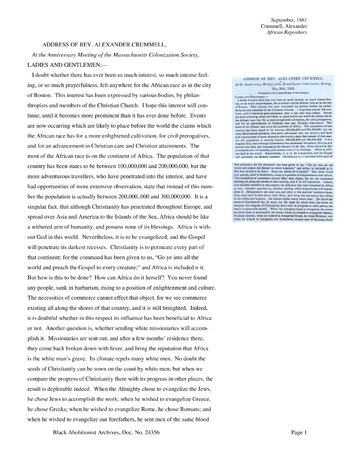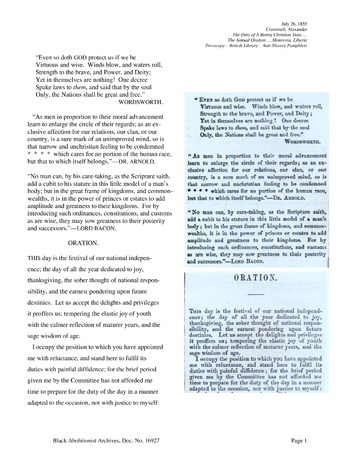
Speaker or author: Crummell, Alexander, 1819-1898
Newspaper or publication: Presscopy -- New York Public Library -- Schomburg Collection
Lengthy speech describing the current situation in the new colony of Monrovia in Liberia, Africa. The speaker emphasized the positive aspects of an abundance of natural resources, a freedom based society and a just government available there. (speech 23971 is a duplicate of this speech)
Description of file(s): PDF 16 page, 4,524 word document (text and images)

Speaker or author: Crummell, Alexander, 1819-1898
Newspaper or publication: African Repository
Lengthy speech describing the current conditions in Africa, the new colony in Monrovia and in Liberia. The speaker emphasized the abundance of natural resources, the stability of the freedom based government, and the availability of education to everyone. (Speech 24099 is a duplicate of this speech. Speech 24140 offers another version of this speech.)
Description of file(s): PDF 13 page, 5,852 word document (text and images)

Speaker or author: Crummell, Alexander, 1819-1898
Newspaper or publication: Presscopy -- British Library -- Anti-Slavery Pamphlets
Lengthy speech given as the annual oration on Independence Day in Liberia, Monrovia. The speaker emphasized the advances in Monrovia's economy, industry, resources and education of its people made since its humble beginnings.
Description of file(s): PDF 46 page, 12,594 word document (text and images)
(page1).jpg.jpg)
Title: Colored American - February 2, 1839
Speaker or author: editor
Newspaper or publication: Colored American (1837 - 1842)
The writer gives the reasons he believes that the U.S. should recognize the independence of the government of Haiti before giving that recognition to Texas.
Description of file(s): one scanned, two columned, newspaper page
(page1).jpg.jpg)
Title: Colored American - July 1, 1837
Speaker or author: editor
Newspaper or publication: Colored American (1837 - 1842)
The writer believes that the only solution to the problem of corruption and monopoly in the current banking system is to form a national or government regulated bank.
Description of file(s): one scanned, two columned, newspaper page
(page1).jpg.jpg)
Title: Colored American - June 10, 1837
Speaker or author: editor
Newspaper or publication: Colored American (1837 - 1842)
The writer comments on the prejudice so prevelent in public transportation. The emphasis in the country is on the luxury of travel, yet this one simple pleasure is denied to African Americans who must deal with the cruelties of a prejudicial system.
Description of file(s): one scanned, two columned, newspaper page
(page1).jpg.jpg)
Title: Colored American - May 13, 1837
Speaker or author: editor
Newspaper or publication: Colored American (1837 - 1842)
The writer expresses his views regarding the negative impact that southern slavery has on the economics of the northern states.
Description of file(s): one scanned, one columned, newspaper page
(page1).jpg.jpg)
Title: Colored American - November 10, 1838
Speaker or author: editor
Newspaper or publication: Colored American (1837 - 1842)
The writer urges the U.S. government to recognize Hayti as an independent government and a source of economic trade. He notes the irony of sanctioned trade with Texas (and foreign countries) that is less than the potential economic value of trade with Hayti.
Description of file(s): one scanned, two columned, newspaper page
(page1).jpg.jpg)
Title: Colored American - November 17, 1838
Speaker or author: editor
Newspaper or publication: Colored American (1837 - 1842)
The writer urges his readers to investigate the silk producing industry for possible occupations in this field.
Description of file(s): one scanned, one columned, newspaper page

Title: Martin Robison Delany
Speaker or author: Delany, Martin & Campbell, Robert, of the Niger Valley Exploring Party
Newspaper or publication: AD Draft -- Royal Geological Society Archives, London, England
-- Copyright Permission Pending -- Handwritten speech detailing the findings of a geographical expedition made by two explorers: Martin Delany and Robert Campbell. The text details the land mass, the villages, the people, the climate, and the general discoveries made of Western Africa. (This transcription includes the original editing marks made by the writers.)
Description of file(s): PDF 8 page, 1,610 word document (text and images)
(page1).jpg.jpg)
Title: Voice of the Fugitive - December 17, 1851
Speaker or author: editor
Newspaper or publication: Voice of the Fugitive (1851 - 1852)
In order to undermine slavery, the writer suggests going elsewhere for goods like cotton, sugar, coffee, indigo and rice -- the mainstays of the southern economy under slave power. He suggests the Canadian market as the best resource for these products.
Description of file(s): two scanned newspaper pages (three columns)
(page1).jpg.jpg)
Title: Voice of the Fugitive - December 3, 1851
Speaker or author: editor
Newspaper or publication: Voice of the Fugitive (1851 - 1852)
The writer takes a further look at the economic, agricultural, political, and social significance of immigration for African Americans.
Description of file(s): two scanned, two columned, newspaper pages
(page1).jpg.jpg)
Title: Voice of the Fugitive - June 18, 1851
Speaker or author: editor
Newspaper or publication: Voice of the Fugitive (1851 - 1852)
The writer tells his readers that while Detroit receives most of what Canadian farmers produce, there is a large market for these goods in the local area.
Description of file(s): one scanned newspaper column
(page1).jpg.jpg)
Title: Voice of the Fugitive - November 19, 1851
Speaker or author: editor
Newspaper or publication: Voice of the Fugitive (1851 - 1852)
The writer discusses immigration to Canada and the British West Indies by African Americans. He examines this subject from five perspectives: "commercial, agricultural, social, mental, and political."
Description of file(s): two scanned, two columned, newspaper pages
(page1).jpg.jpg)
Title: Voice of the Fugitive - November 5, 1851
Speaker or author: editor
Newspaper or publication: Voice of the Fugitive (1851 - 1852)
The writer tells his readers that by relying on imported food and goods produced in the U.S. Canada is tacitly supporting the slave system. He suggests looking to England and domestically for these things.
Description of file(s): one scanned, two columned, newspaper page
(page1).jpg.jpg)
Title: Voice of the Fugitive - October 21, 1852
Speaker or author: editor
Newspaper or publication: Voice of the Fugitive (1851 - 1852)
The writer tells his readers that Windsor's economy is booming.
Description of file(s): one scanned newspaper column
(page1).jpg.jpg)
Title: Weekly Advocate - February 18, 1837
Speaker or author: editor
Newspaper or publication: Weekly Advocate (1837)
The editor stresses the rise in the cost of everything except the Weekly Advocate. He implies that the newspaper's cost may rise too without an increase in subscriptions.
Description of file(s): one scanned, one columned, newspaper page
([page1).jpg.jpg)
Title: Weekly Anglo-African - April 7, 1860
Speaker or author: editor
Newspaper or publication: Weekly Anglo-African (1859 - 1862)
The writer comments on a published account of the array of statistics on how the North is profiting on Southern wealth. Thomas Prentice Kettel had recently published a book on the vast wealth produced in the southern states that the parasitic North, with its dependence on raw materials, benefitted from. The book argues that the result of this concentration of manufacturing in the north is sectional inequality. The North was dominating communications, transportation, finance, and international trade, while the South was growing weaker and poorer.
Description of file(s): one scanned newspaper column
(page1).jpg.jpg)
Title: Weekly Anglo-African - February 11, 1860
Speaker or author: editor
Newspaper or publication: Weekly Anglo-African (1859 - 1862)
As the country moves from its agricultural roots to an economy built on manufacturing, the writer wonders who will the South find to run the factories? If the answer is "the slaves," then this will require the slaves to be better educated. If this is to take place, the current system of slavery must change dramatically.
Description of file(s): one scanned, three columned, newspaper page
(page1).jpg.jpg)
Title: Weekly Anglo-African - May 4, 1861
Speaker or author: editor
Newspaper or publication: Weekly Anglo-African (1859 - 1862)
The writer reports on the current economic status of the West Indies. Since Emancipation, the islands have flourished, both socially and economically.
Description of file(s): two scanned newspaper pages (three columns)



